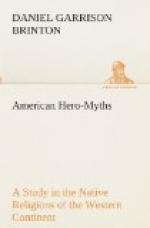Such was the extraordinary address with which the Spaniard, with his handful of men, was received by the most powerful war chief of the American continent. It confessed complete submission, without a struggle. But it was the expression of a general sentiment. When the Spanish ships for the first time reached the Mexican shores the natives kissed their sides and hailed the white and bearded strangers from the east as gods, sons and brothers of Quetzalcoatl, come back from their celestial home to claim their own on earth and bring again the days of Paradise; [1] a hope, dryly observes Father Mendieta, which the poor Indians soon gave up when they came to feel the acts of their visitors.[2]
[Footnote 1: Sahagun, Historia, Lib. xii, cap. ii.]
[Footnote 2: “Los Indios siempre esperaron que se habia de cumplir aquella profecia y cuando vieron venir a los cristianos luego los llamaron dioses, hijos, y hermanos de Quetzalcoatl, aunque despues que conocieron y experimentaron sus obras, no los tuvieron por celestiales.” Historia Eclesiastica Indiana, Lib. ii, cap. x.]
Such presentiments were found scattered through America. They have excited the suspicion of historians and puzzled antiquaries to explain. But their interpretation is simple enough. The primitive myth of the sun which had sunk but should rise again, had in the lapse of time lost its peculiarly religious sense, and had been in part taken to refer to past historical events. The Light-God had become merged in the divine culture hero. He it was who was believed to have gone away, not to die, for he was immortal, but to dwell in the distant east, whence in the fullness of time he would return.
This was why Montezuma and his subjects received the whites as expected guests, and quoted to them prophecies of their coming. The Mayas of Yucatan, the Muyscas of Bogota, the Qquichuas of Peru, all did the same, and all on the same grounds—the confident hope of the return of the Light-God from the under world.
This hope is an integral part of this great Myth of Light, in whatever part of the world we find it. Osiris, though murdered, and his body cast into “the unclean sea,” will come again from the eastern shores. Balder, slain by the wiles of Loki, is not dead forever, but at the appointed time will appear again in nobler majesty. So in her divine fury sings the prophetess of the Voeluspa:—
“Shall arise a second time,
Earth from ocean, green and fair,
The waters ebb, the eagles fly,
Snatch the fish from out the flood.
“Once again the wondrous runes,
Golden tablets, shall be found;
Mystic runes by Aesir carved,
Gods who ruled Fiolnir’s line.
“Then shall fields unseeded bear,
Ill shall flee, and Balder come,
Dwell in Odin’s highest hall,
He and all the happy gods.
“Outshines the sun that mighty hall,
Glitters gold on heaven’s hill;
There shall god-like princes dwell,
And rule for aye a happy world.”




